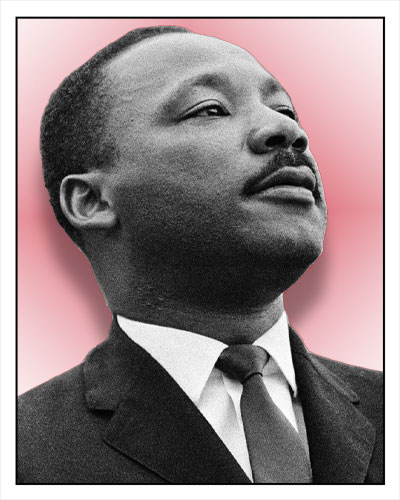Martin Luther King, Jr., (born Michael King Jr.; January 15, 1929 – April 4, 1968) delivering a speech in Berkeley, California, 1967.
 His leadership was fundamental to that movement’s success in ending the legal segregation of African Americans in the South and other parts of the United States. King rose to national prominence as head of the Southern Christian Leadership Conference, which promoted nonviolent tactics, such as the massive March on Washington (1963), to achieve civil rights. He was awarded the Nobel Peace Prize in 1964. His leadership was fundamental to that movement’s success in ending the legal segregation of African Americans in the South and other parts of the United States. King rose to national prominence as head of the Southern Christian Leadership Conference, which promoted nonviolent tactics, such as the massive March on Washington (1963), to achieve civil rights. He was awarded the Nobel Peace Prize in 1964.
As with the lives of other major historical figures, King’s life has been interpreted in new ways by successive generations of scholars, many of whom have drawn attention to the crucial role of local Black leaders in the African American protest movements of the 1950s and ’60s. Recognizing that grassroots activists such as Rosa Parks, Fred Shuttlesworth, and others prepared the way for King’s rise to national prominence, biographers and historians have questioned the view that Southern Black protest movements relied on King’s charismatic guidance. Nonetheless, studies of King continue to acknowledge his distinctive leadership role. For example, though he often downplayed his contribution to the Montgomery bus boycott, King’s inspirational leadership and his speeches helped to transform a local protest over bus seating into a historically important event. More generally, studies of King have suggested that his most significant contribution to the modern African American freedom struggle was to link Black aspirations to transcendent, widely shared democratic and Christian ideals. While helping grassroots leaders mobilize African Americans for sustained mass struggles, he inspired participants to believe that their cause was just and consistent with traditional American egalitarian values. King also appealed to the consciences of all Americans, thus building popular support for civil rights reform. His strategy of emphasizing nonviolent protest and interracial cooperation enabled him to fight effectively against the Southern system of legalized racial segregation and discrimination, but it also proved inadequate during his final years as he sought to overcome racial and economic problems that were national in scope. |




 His leadership was fundamental to that movement’s success in ending the legal segregation of African Americans in the South and other parts of the United States. King rose to national prominence as head of the Southern Christian Leadership Conference, which promoted nonviolent tactics, such as the massive March on Washington (1963), to achieve civil rights. He was awarded the Nobel Peace Prize in 1964.
His leadership was fundamental to that movement’s success in ending the legal segregation of African Americans in the South and other parts of the United States. King rose to national prominence as head of the Southern Christian Leadership Conference, which promoted nonviolent tactics, such as the massive March on Washington (1963), to achieve civil rights. He was awarded the Nobel Peace Prize in 1964. 